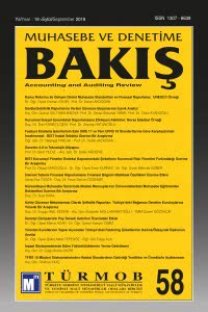FAALİYET TABANLI MALİYETLEME YÖNTEMİNİN TEMEL MALİ TABLOLAR ÜZERİNDEKİ ETKİLERİ
Faaliyet Tabanlı Maliyetleme Yöntemi, Temel Mali Tablolar, Maliyet Sistemleri
___
- AKGÜN Melek, “Kalite Maliyetlerinin Faaliyet Tabanlı Maliyetleme Sistemine Entegrasyonu”, Muhasebe ve Denetime Bakış, Yıl:5, Sayı:15, Mayıs 2005.
- BEAUJON, George J.- SİNGHAL, Vinod R., “Understanding The Activity Costs in An Activity-Based Cost System”, Journal of Cost Management for Manufacturing Industry,Spring 1990.
- BENGÜ Haluk, “Faaliyet Tabanlı Maliyetleme Sisteminde Faaliyet Seviyelerinde Maliyet Uygulaması”, MU- FAD Muhasebe ve Finansman Dergisi, Sayı:25, Ocak 2005
- BLOCHER Edward J., CHEN Kung H., LİN Thomas W., “Cost Management: A Strategic Emphasis”, New York, Second Edition, Mc Graw Hill/Irwin Companies, Inc., 2002
- BRIMSON J.A., Activity Accounting, John Wiley Sons, New York, 1991.
- BÜYÜKMİRZA Kamil, Maliyet ve Yönetim Muhasebesi, Gazi Kitabevi, 9. Baskı, Ankara 2003.
- COOPER, R., KAPLAN, R.S., “Activity Based Systems:Measuring the Costs of Resource Usage”, Accounting Horizons, September, 1992.
- ÇAKICI Cemal, “Faaliyet Tabanlı Maliyetleme Uygulaması ve Muhasebeleştirilmesi”, MUFAD Muhasebe ve Finansman Dergisi, Sayı:12, Ekim 2001
- ERDEN Selman Aziz, “İnşaat İşletmelerinde İnşaat Maliyetlerinin Tespitinde Faaliyet Tabanlı Maliyetleme Yak- laşımının Yeri”, Muhasebe ve Denetime Bakış Dergisi, Yıl:4, Sayı:11, Ocak 2004.
- ERDOĞAN Necmettin, Maliyet Muhasebesi, Barış Yayınları, 1. Baskı, İzmir 1999.
- GARRISON, R., ERIC, N.W., Managerial Accounting: Concepts for Planning, Control Decision Making, Ir- win, Illinois, 1992.
- GİLLİAN Brian P., “Traditional Cost Accounting Needs Some Adjustments...As Easy As ABC”, Industrial En- gineering, Vol:24, No:4, April 1990.
- HACIRÜSTEMOĞLU Rüstem, Maliyet Muhasebesi, İstanbul: Dizgi-Baskı-Cilt Ders Kitapları A.Ş. Tesisleri, KARCIOĞLU Reşat, Stratejik Maliyet Yönetimi-Maliyet ve Yönetim Muhasebesinde Yeni Yaklaşımlar, Aktif Yayınevi, Erzurum, 2000.
- KETZ J. Edward, CAMPBELL Terry L., BAXENDALE, Sidney J., Management Accounting, San Diego, Har- court Brace Jovanovich, Inc., 1991.
- KÖSE Tunç, “Faaliyete Dayalı Maliyetleme ve Kısıtlar Teorisinin Bütünleştirilmesi”, Muhasebe ve Denetime Bakış Dergisi, Yıl:4, Sayı:14, Ocak 2005
- KREUZE, Jerry G. - NEWELL, Gale E., “ABC and Life-Cycle Costing For Environmental Expenditures”, Ma- nagement Accounting, Vol:75, No:8, February 1994.
- MORGAN M.J., “Testing Activity-Based Costing Relevance”, Management Accounting, Vol:31, No:3, 1993.
- ÖZBİRECİKLİ Mehmet, “Maliyet Muhasebesinde Yeni Bir Yaklaşım: Faaliyet Esasına Dayalı Maliyetleme Sis- temi”, Çukurova Üniversitesi İ.İ.B.F. Dergisi, Cilt:5, Sayı:1, Yıl:1995.
- ÖZER Alper, “Pazarlama İle İlgili Kararlarda Faaliyet Tabanlı Maliyetlemenin Etkisi”, Muhasebe ve Denetime Bakış Dergisi, Yıl:4, Sayı:13, Eylül 2004.
- PARLAKKAYA Raif, ALTAN Mikail, “Kobilerde Maliyet Yönetimi”, Kobinet.org.tr/hizmetler/bilgibankası/ekonomi/OAKDocs/OAK-T7.pdf. PEKDEMİR Recep, Faaliyet Tabanlı Maliyetleme ve Genel İmalat Maliyetleri, İstanbul, 1998.
- RAFFISH, N., TURNEY, P.B.B., “Glossary of Activity Based Management”, Journal of Cost Management, Vol:5, No:3, 1991.
- RAYBURN Letricia Gayle, Cost Accounting:Using a Cost Management Approach, Sixth Edition, Times Mir- ror Higher Education Group, Inc., 1996.
- ROMANO P.L., “Where is the Cost Management Going”, Management Accounting, August, 1990.
- ROTCH William, “Activity-Based Costing in Service Industries”, Journal of Cost Management for Manufac- turing Industry, Summer 1990.
- ŞAKRAK Münir, Maliyet Yönetimi-Maliyet ve Yönetim Muhasebesinde Yeni Yaklaşımlar, Yasa Yayınları, İs- tanbul,1997.
- TURNEY Peter B.B., “What is The Scope of Activity-Based Costing?”, Journal of Cost Management for Ma- nufacturing Industry, Winter 1990.
- YÜKÇÜ Süleyman, Yönetim Açısından Maliyet Muhasebesi, 4.Baskı, Anadolu Matbaacılık, İzmir, 1999.
- ISSN: 1307-6639
- Yayın Aralığı: 3
- Başlangıç: 2000
- Yayıncı: TÜRMOB
FAALİYET TABANLI MALİYETLEME YÖNTEMİNİN TEMEL MALİ TABLOLAR ÜZERİNDEKİ ETKİLERİ
ENFLASYON DÜZELTMESİ UYGULAMASININ MESLEK MENSUPLARINA ETKİSİ ÜZERİNE BİR ARAŞTIRMA
Aydın KARAPINAR, Yıldız AYANOĞLU
FİRMA DEĞERİAÇISINDAN KAR VE NAKİT KAVRAMI : İMKB’DE DENEYSELBİR İNCELEME
YENİLİKÇİYÖNETİM MUHASEBESİ ANLAYIŞINDA SORUMLULUK MUHASEBESİ SİSTEMİNİN DEĞERLENDİRİLMESİ
Hilmi Erdoğan YAYLA, Ekrem CENGİZ
KURUMSAL ŞİRKET YÖNETİMİNDE FİNANSALBİLGİNİN ROLÜ
Cemal KÜÇÜKSÖZEN, Güray KÜÇÜKKOCAOĞLU
DEVLETİN DURAN VARLIKLARININ MUHASEBELEŞTİRİLMESİNİN KAMU MALİYESİNE YANSIMALARI
YÖNETİM MUHASEBECİLERİ AÇISINDAN ETİK VE ETİK DAVRANIŞIN ÖNEMİ
